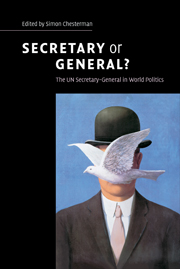Book contents
- Frontmatter
- Contents
- Contributors
- Foreword
- Acknowledgements
- Introduction: secretary or general?
- PART I Defining and refining the job description
- PART II Maintaining peace and security
- PART III Normative and political dilemmas
- 7 The Secretary-General as norm entrepreneur
- 8 Pope, pharaoh, or prophet? The Secretary-General after the Cold War
- 9 Leader, clerk, or policy entrepreneur? The Secretary-General in a complex world
- PART IV Independence and the future
- APPENDIX: selected documents on the Secretary-General
- Select bibliography
- Index
9 - Leader, clerk, or policy entrepreneur? The Secretary-General in a complex world
Published online by Cambridge University Press: 06 January 2010
- Frontmatter
- Contents
- Contributors
- Foreword
- Acknowledgements
- Introduction: secretary or general?
- PART I Defining and refining the job description
- PART II Maintaining peace and security
- PART III Normative and political dilemmas
- 7 The Secretary-General as norm entrepreneur
- 8 Pope, pharaoh, or prophet? The Secretary-General after the Cold War
- 9 Leader, clerk, or policy entrepreneur? The Secretary-General in a complex world
- PART IV Independence and the future
- APPENDIX: selected documents on the Secretary-General
- Select bibliography
- Index
Summary
Debates about the leadership of intergovernmental organizations return again and again to the same, unhelpful alternatives. For a century, diplomatic discussions of what one should seek in a Secretary-General have turned repeatedly to one or another version of this question: do we want strong leadership, modelled on the charismatic French socialist Albert Thomas, the first Director-General of the International Labour Organization(ILO)? Or do we want a clerk to serve member states, in the style of British civil servant Sir Eric Drummond, the first Secretary-General of the League of Nations?
This debate mirrors a whole series of institutional design issues that have divided committed internationalists and nationalists, foreign policy idealists and realists, partisans of multilateralism and of state sovereignty. Do international institutions have independent “legal personality”, or are they the agents of their members? Should international institutions have a general or only a functional “immunity”? Is there an inherent right to withdrawal from international institutions – or can states terminate their cooperation at will? When speaking about the Secretary-General, the parallel question is, in the words of Inis Claude, whether the incumbent should be a “leader” or a “clerk”. If one thinks that intergovernmental institutions should be more than the sum of their members, one will lean in a particular direction on all these questions; if one is more sceptical, viewing the institutions in the United Nations system as tools that may or may not be useful, one will lean the other way.
In recent years, it has become customary to contrast the foreign policy establishments of New York and Washington along similar lines.
- Type
- Chapter
- Information
- Secretary or General?The UN Secretary-General in World Politics, pp. 158 - 182Publisher: Cambridge University PressPrint publication year: 2007
- 1
- Cited by

